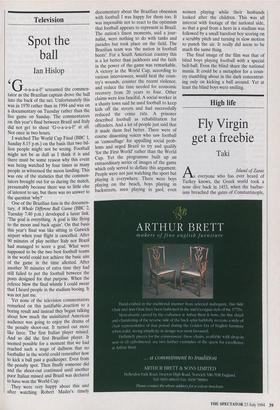Television
Spot the ball
Ian Hislop
G-o-a-a-a-l!' screamed the commen- tator as the Brazilian captain drove the ball into the back of the net. Unfortunately this was in 1970 rather than in 1994 and was on a documentary on Tuesday rather than the live game on Sunday. The commentators on this year's final between Brazil and Italy did not get to shout `G-o-a-a-a-l!' at all. Not once in two hours.
I watched The World Cup Final (BBC 1, Sunday 8.15 p.m.) on the basis that two bil- lion people might not be wrong. Football might not be as dull as I think it is and there must be some reason why this event was being watched by four times as many people as witnessed the moon landing. This was one of the statistics that the commen- tators brought out for us during the match, presumably because there was so little else of interest to say, but there was no answer to the question 'why?'
One of the Brazilian fans in the documen- tary, A Whole Different Ball Game (BBC 2, Tuesday 7.40 p.m.) developed a lunar link. 'The goal is everything. A goal is like flying to the moon and back again'. On that basis this year's final was like sitting in Gatwick airport when your flight is cancelled. After 90 minutes of play neither Italy nor Brazil had managed to score a goal. What were supposed to be the two best football teams in the world could not achieve the basic aim of the game in the time allotted. After another 30 minutes of extra time they had still failed to put the football between the posts designed for that purpose. When the referee blew the final whistle I could swear that I heard people in the stadium booing. It was not just me.
Yet none of the television commentators remarked on this justifiable -reaction to a boring result and instead they began talking about how much the uninitiated American audience was going to enjoy the drama of the penalty shoot-out. It turned out more like farce. The first Italian player missed. And so did the first Brazilian player. It seemed possible for a moment that we had reached such a stage of dullness that no footballer in the world could remember how to kick a ball past a goalkeeper. Even from the penalty spot. Then finally someone did and the shoot-out continued until another poor Italian missed and Brazil was declared to have won the World Cup.
They were very happy about this and after watching Robert Mader's timely documentary about the Brazilian obsession with football I was happy for them too. It was impossible not to react to the optimism that football appears to represent in Brazil. The nation's finest moments, said a jour- nalist, were nothing to do with tanks and parades but took place on the field. The Brazilian team was 'the nation in football boots'. For a South American country this is a lot better than jackboots and the faith in the power of the game was remarkable. A victory in the World Cup, according to various interviewees, would heal the coun- try's wounds, counter the recent violence, and reduce the time needed for economic recovery from 20 years to four. Other claims were less fanciful. A social worker in a shanty town said he used football to keep kids off the streets and had successfully reduced the crime rate. A prisoner described football as rehabilitation for offenders. And a lot of people just said that it made them feel better. There were of course dissenting voices who saw football as 'camouflage' for appalling social prob- lems and urged Brazil to try and qualify 'for the First World' rather than the World Cup. Yet the programme built up an extraordinary series of images of the game which only served to deflate this argument. People were not just watching the sport but playing it everywhere. There were boys playing on the beach, boys playing in backstreets, men playing in gaol, even women playing while their husbands looked after the children. This was all intercut with footage of the national side, so that a goal from a hero in a stadium was followed by a small barefoot boy scoring on a scrubby pitch and turning in slow motion to punch the air. It really did seem to be much the same thing.
The final image of the film was that of blind boys playing football with a special bell-ball. Even the blind share the national mania. It could be a metaphor for a coun- try stumbling about in the dark concentrat- ing only on kicking a ball around. Yet at least the blind boys were smiling.


















































 Previous page
Previous page